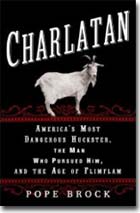Books |
Charlatan
Pope Brock
By
Published: Jan 01, 2008
Category:
Biography
Charlatan: America’s Most Dangerous Huckster, the Man Who Pursued Him, and the Age of Flimflam
Pope Brock
John R. Brinkley snipped the testicles from a goat.
He made neat incisions on the comparable zone of a male patient.
He tossed the goat testicles in and sewed the patient up.
He charged $750 for this operation. (In the 1920s, when he plied the surgeon’s trade, that was the equivalent of about $7,500 today.)
Sixteen thousand men submitted.
More than a few died.
How did this grotesque medical fraud happen? Well, Brinkley started in Kansas, where the citizenry apparently has a soft spot for charlatans. His claims appealed to the rest of the country because, writes Pope Brock, “When it came to physicians, Americans not only tolerated but demanded incompetence.” And he got away it with it because, as late as the 1920s, most states had no licensing requirements for doctors.
Who was John Brinkley? Clearly, an opportunist. He enrolled in the grandly named Bennett Eclectic Medical College (though he drank his way out well before graduation). He made his first score in South Carolina (where he injected patients with colored water that he called it “electric medicine” from Germany). He skipped town, but got arrested anyway.
In 1917, Brinkley moved to Milford, Kansas (population: 200). When a patient complained about lost sexual oomph and wished he had “billy-goat nuts,” the penny dropped. A few days later, Brinkley performed his first experiment in gland transplants. Soon the patient was back, grinning. And with that, Brock writes, “the goat was out of the bag.”
Within a year, Brinkley had a 16-room “Institute of Health” — and some compelling advertising. “All energy is sex energy,” he proclaimed. “A man is as old as his glands.” Perhaps, but a man can’t be healthier than his doctor is competent — Brinkley was known to operate after the cocktail hour and, when busy, pass off patients to even less competent assistants.
Why did no one blow the whistle? Well, the press had its reasons to overlook medical fraud — as much as half the advertising revenue in American newspapers was for patent medicines. And Brinkley made great copy. He was successful (he took in $500,000 a month, and that’s 1920s currency), he had celebrity clients (some of them paid extra for testicles from recently executed prisoners), and he was the first huckster to understand the power of media.
Brinkley started with a Kansas radio station. He had enough guests for a dozen variety shows. And, every once in a while, he’d break into a testimonial for himself. This soon took the form of a show called “Medical Question Box”. Brinkley’s answers invariably involved “medicines” that he manufactured. You may imagine the contents — and the profit.
By 1930, Brinkley was running the most popular radio station in America. But the government had belatedly noticed that the station was no public service; it existed solely to promote Brinkley. First he lost his broadcast license. Then Kansas revoked his medical license.
Was Brinkley whipped? Hey, we’re just halfway through the book — this crook was just getting started! And if your mouth hung open for most of the first 150 pages, you’re in for some serious shocks in the next 125. Decades before McLuhan, Brinkley understood electronic media. A few years ahead of Hitler, he had perfected the big lie. And in the American public, he was dealing with the ultimate focus group — a nation of suckers.
“Charlatan” is a romp of a book, with characters colorful and unprincipled, and a handful who are steadfast and honorable. It’s filled with fascinating digressions and crazy trivia. And it’s light on the moralizing — this is a book that starts with the castration of a goat and ends, improbably, with ZZ Top.
Fraud is rarely this much fun.
To buy “Charlatan” from Amazon.com, click here.


